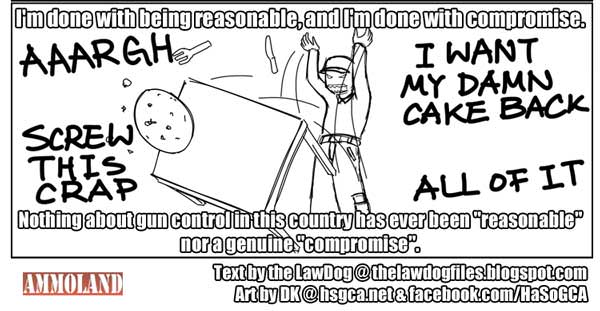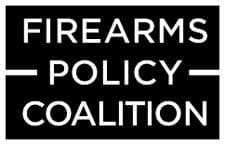

Roseville, CA -(AmmoLand.com)- Gun owners–for amusement, sport, or whatever reason–sometimes engage in discussions on the topic of “compromise.”
More specifically, hypotheticals are created along the lines of a statement (“if we give up X things, then they should give up Y things”) or a question (“would you accept Y things in exchange for X things?”) and offered up to a community for consideration, with the subsequent debate generally exploring the “compromise” in terms of framing narratives or measuring the costs and benefits of the idea. But do ideological or practical “compromises” offer value for proponents of gun rights?
What is a compromise, really?
While these sort of hypothetical exercises can provide some entertainment value, the seriousness of the underlying issues makes the evaluation deserving of more than passing consideration. Let’s begin the analysis with the definition of “compromise.” According to Merriam-Webster, a compromise is:
1 a : settlement of differences by arbitration or by consent reached by mutual concessions
b : something intermediate between or blending qualities of two different things
2 : a concession to something derogatory or prejudicial <a compromise of principles>

In the subject “gun-freedom-for-gun-control” horse trade hypotheticals, a gun owner will create a list of things that they want (gun freedoms) and a list of other things they would be willing to concede or consent to (gun restrictions) in order to acquire their desired things. This seems to fit nicely into one (the most flattering and equitable) definition of compromise: the “settlement of differences by arbitration or by consent reached by mutual concessions.”
But do “compromises” have real, measurable upside for gun owners? Are “compromises” of this sort even possible? To address these questions, we need to look at the environments in which these “compromises” might operate. Before we do, however, let’s explore our society’s general predisposition to the acceptance of “reasonable restrictions” on rights–and how that acceptance affects the value analysis of any hypothetical “compromise.”
“…shall not be infringed.”
“…[T]he right of the people to keep and bear Arms, shall not be infringed.” To many people, this much-debated command in our Constitution’s Second Amendment has one very simple bottom line: every conceivable restriction on the individual right to keep and bear arms is an impermissible one.
However, when limits on gun rights (or any negative rights, for that matter) are discussed in more depth, we usually find that most people have a view of rights–even fundamental, individual ones–that is not as “unlimited” or absolute as the former conclusion (and sometimes not even as broad as they previously considered their own views to be).
Arriving at such a precept can take many forms, some more direct than others. For example, in any debate on gun rights you will usually find some people conceding (sometimes before the debate begins) that they take no issue with a total prohibition on gun possession by convicted felons and the mentally ill, or granting that some categories of arms are outside the scope of the Second Amendment’s protections.
Another avenue to what is ultimately the same concession is to discuss time, place, and manner restrictions on the right to carry loaded guns outside our homes, such as the constitutionality or acceptability of restrictions on carrying guns inside jails or courthouses.
Once a person is working from the axiom that some (one, or many) limitations on the exercise of a right are constitutional, reasonable, good policy, or simply immaterial to them, the rest becomes an exercise in ‘Fifty Shades of Regulatory Grey.’ And this “squishy middle” is where the question of “compromise” generally presents.
When does a restriction become an impermissible “infringement?” Following Heller and McDonald, that question is often answered by our courts (all too often in controversial decisions of a “questionable nature”), but it can also be affirmatively addressed in legislative and executive acts, opinion polls, and in the voting booth.
At this point, the “bottom line”–or perhaps more accurately, the “line in the sand”–becomes exceedingly dependent on one’s own interests and values. And the same holds true for elected officials, government agencies, and judges and juries.
What is there to “compromise” on?
First, some foundational discussion of gun control in the abstract.
Gun control regulations, like all others, are really just elements of a framework, each having discreet functions and inter-dependencies that operate collectively to achieve a particular social outcome. The efficiency of each regulation is, more or less, dependent on the existence and enforcement of other controls. Said differently, gun control laws do not independently create an “effective” regulatory scheme. (Obviously, this is not to suggest that even well-implemented gun control is “effective” or “efficient” in preventing crimes with firearms. Data shows that even in jurisdictions where gun control is absolute or near-absolute, crimes involving guns still occur. And indeed, the very text of the Second Amendment gives force to the proposition that gun control mustn’t be so effective or so efficient that it becomes an infringement on the rights of the People.)
Let’s take, for instance, the hotly-debated “universal background checks” that various gun control groups and PACs are spending millions of dollars to enact wherever they can. It is important to understand that “universal background checks”–regardless of how “reasonable” the concept may seem at first glance–do not fully accomplish the over-arching gun control regulatory mission. For the regulatory system to ‘work,’ gun owner/firearm registration and laws authorizing disarmament by force must be enacted and enforced.
A perfectly-executed background check system that queries a flawless and complete database might prevent someone the government says (and knows) should not have a gun from acquiring one through legitimate channels (e.g., at a licensed gun store). And, obviously, even this relatively robust system is not useful in preventing an illegal black-market purchase or disarming a prohibited person who illegally acquires a firearm in a transaction unknown to the government.) No, such a system does not consider the black market (how could it?) nor is it equipped to handle the other side of the regulatory scheme: Disarming people (confiscation through force of law) who become a “prohibited person” (the definition of which is a constantly-moving target) after they’ve legally acquired a gun. For that, the gun control schema relies on retained transactional data (registration) and monitoring.
So, a hypothetical “compromise” on “universal background checks”–where there are no provisions for registration and conditional disarmament by force–is less than half of the “bargain” some might think about signing up for. Make no mistake, where the People “give up” and enact (by ballot or through legislation) so-called “universal background checks,” gun control advocates will eventually come back around to collect the other [more than] half of their regulatory “solution.” Without it, they are left with an incomplete system of regulating guns and gun owners. (It is a terminal mistake for gun owners to under-estimate the intelligence, investment, and patience of those who lead the “new” gun control movement. No, I’m not talking about mouthpieces like Shannon Watts.)
And what about the “give up” by gun control advocates in consideration for the gun owners’ “compromise” on gun freedoms? Where can we find a list of those offerings? Where do they define where their “reasonable regulations” end?
Up to this point–and likely into the future–those who seek to implement more and stronger restrictions on gun freedoms have offered gun owners nothing in return for their ask of “compromising” on Second Amendment rights. It should be no surprise, then, that gun owners have been and remain unwilling to participate in a “compromise” that isn’t.
Is there room for “compromise” in gun rights? Some closing thoughts.
The value of any compromise is relative to (and dependent on) the environment in which the compromise takes effect.
For example, a gun rights “give up” on a ‘national firearm owner identification card/permit’ (e.g., a registry of gun owners) would be a significant change in the federal gun control landscape, and certainly a shock to the people of “free states” like Arizona. But the same “give up” is less meaningful in the context of those subject to California law because (for the most part) the State already tracks and maintains a robust database of guns, gun owners, and transfers.
And while a gun control “give up” on the National Firearms Act of 1934 (perhaps with a corresponding elimination of the Hughes Amendment to the Firearm Owners’ Protection Act of 1986) would be a noticeable shift toward individual freedom and social trust, it wouldn’t matter much in those jurisdictions where the subject items in the NFA are heavily regulated or banned outright under state or local laws
So the “value” of any “compromise” is, once again, dependent on one’s own interests and values–and the laws of the state and town in which they reside. The gun control framework is multi-dimensional, and any objective value analysis of a “compromise” must also be multi-dimensional.
We often hear politicians, editorial boards, talking heads, and gun control advocates complain that America’s millions upon millions of law-abiding gun owners (people they unreservedly attack in word and law) refuse to “compromise” and support their preferred “public safety” policies. But, even setting aside the concept and application of fundamental rights, there’s a rather astounding lack of attention paid to the total vacuum of equity in every proposal that we are supposed to “compromise” on. The simple reason is that gun control proponents have no desire for or intention of actually engaging in good-faith “compromise” at all: They want what they want and will accept (take) nothing less. No, the same people crying out for “compromise” from gun owners bring absolutely nothing to the table.
And those of us who fight to restore fundamental, individual Second Amendment rights–rights that have been stripped away entirely, or regulated into a set of near-meaningless “exemptions” from expansive criminal laws through which, if we are so lucky, we can take our families to the range for an afternoon of target shooting or competition without going to prison–similarly refuse to “compromise.”
No, there is no compromise–or room for compromise–in today’s gun control debate. And there won’t be anytime soon. If the likes of Michael Bloomberg and George Soros want us to “compromise” our rights away, here’s a “compromise” they should remember: μολὼν λαβέ.
Brandon Combs is the President of Firearms Policy Coalition.

About Firearms Policy Coalition
Firearms Policy Coalition is a nonprofit civil rights advocacy organization that serves its members and the public through legal efforts, direct and grassroots lobbying, education, and technology. FPC’s mission is to protect and defend the Constitution of the United States and the inalienable, fundamental, individual right to keep and bear arms.
For more information, please visit www.FirearmsPolicy.org.
